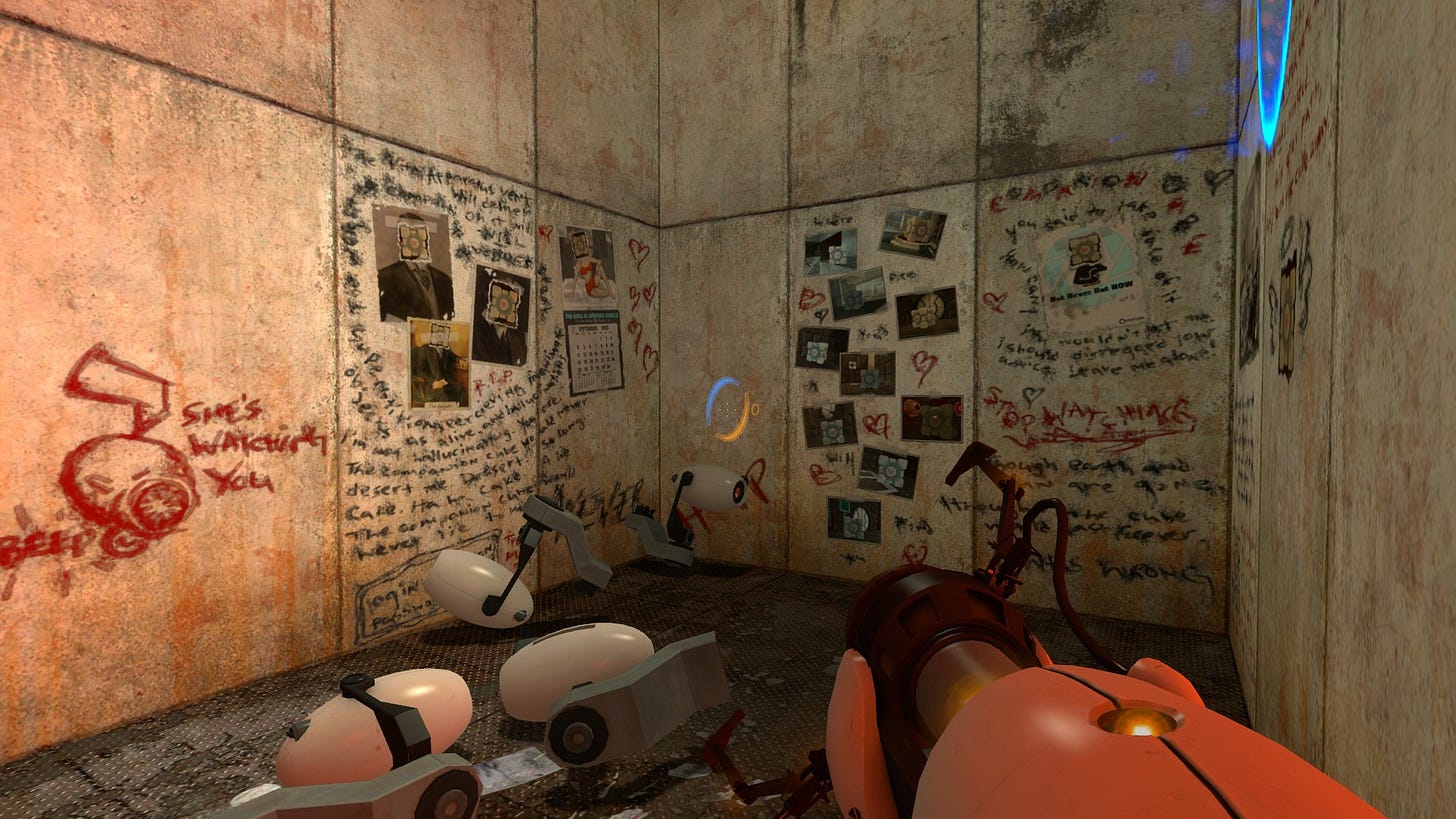Portal
Get in here and join me and my Weighted Companion Cube.
It’s probably a bit predictable of me to do this, but I’ve never had the chance until now, so: This was a triumph. I’m making a note here, huge success.
I am going to spoil Portal – you have been warned, but you’ve also had 17 years to play it. If you haven’t played it, please stop wasting your time on my website and play it. If nothing else, I would be fascinated to know how it feels to play it for the first time now.
For anyone who doesn’t already possess an intimate familiarity with the game Portal, it’s a short (easily completable in four hours) game wherein you have a portal gun. You go in the blue one and come out the orange one, or vice versa, and through this you solve a variety of puzzles.
The ‘test chambers’ that comprise the levels in Portal are white, sterile, and clinical. There is no sign of any other person at the Aperture Science testing facility, apart from the disembodied voice of GlaDOS, an all-seeing robot who offers helpful advice such as "If you become lightheaded from thirst, feel free to pass out.”
The combination of the empty rooms, echoing solitude, and weird AI lady achieves a deeply immersive, unsettling atmosphere extremely frugally. The one-way windows in some of the rooms only add to the sense of unease. When you start to discover messages left behind by a previous test subject hidden behind wall panels, Portal does a very good impression of a horror game.
Test chambers 1-16 or so are quick to solve, but the last few really open up to provide some more challenging puzzles. Even so, none of the game’s levels are particularly difficult – I am notoriously bad at puzzles (as documented extensively on this website) and still only took an average length of time on the game.
When it emerges that GlaDOS’s promises of cake were somewhat exaggerated and you make a daring escape outside the bounds of the test chambers, the environments change drastically. The first hour of the game, spent in the dispassionate rooms with the same padded lift between each one, is extremely iconic and extremely recognisable – but for me, it’s the latter half of the game, spent amongst offices and pipes and dilapidated rooms of pipes that remain the most memorable. I found these environments transportive, returning me to playing this game for the first time. They are also creepy and ominous, dotted about with markings directing you towards the exit (daubed in red – paint, or something more sinister?).
Portal is more devious than you thought, and betrayal is layered atop betrayal. Not only was GlaDOS lying about the cake, but your secret unseen guide was not leading you towards the exit, but instead to GlaDOS’s throne room, where she is mounted intimidatingly above you.
The boss fight is fairly typical – figure out the thing to do and do it three times. It was intuitive and not too challenging, and rather than trying to introduce any combat elements, you are using the mechanics the game has taught you over the runtime. Use portals to take a thing from where it is to where you want it to be.
Then, at the end, the iconic song. At once funny and threatening, with its promise of retribution, Still Alive is just such a peak of nerd-dom.
Portal came out in 2007, when I was 17. It was one of the first games I remember being aware of before its release, and excited to check out. I played it at my sixth form boyfriend’s house (I didn’t have broadband or a Steam account) immediately after him, and the speed at which it entered our lexicon as a cultural touchpoint was (and remains) unmatched.
I’m struggling to put into words (not a good look for a writer) just how vast the effect Portal had on the world. “The cake is a lie” became something people said to each other to test the waters – “do we understand each other?” it meant. Weighted Companion Cubes became the must-have accessory (I’m still sad I never had a big plushie one). My brother received a Portal cake at a subsequent birthday.
Replaying it for this review felt like when I watched Jurassic Park for the first time when I was about 29, but more of a remembering than a discovering. Every line GlaDOS came out with was familiar to me, not because I have that good a memory to know it from my first playthrough, but because these words are part of culture now. I was concerned that it would feel tired in 2025 – I am especially prone to becoming disenchanted with old games – but it really still shone. Even the humour, which I do think can be hit and miss, still really works.
I firmly believe that everyone should play Portal. If you haven’t played it, doing so will contextualise so much culture, and if you don’t like it, a) it only lasts a couple of hours, so no worries, and b) don’t tell me, just keep that to yourself.
It was so fun to go back and revisit this all-time classic. I’d love to hear about your experiences with the game, so leave me a comment below.







The ability to play Portal all the way through in a single sitting is one of its greatest strengths, I think. You get fully immersed in the world of the test chambers, wake up stuck and attempt to escape all in one go.
I love it so much and I’m not a big puzzle gamer either. It really had a profound impact on millennial nerd culture. Surprising how good Portal 2 was too, it actually managed to build upon the great success.
You know reading this makes me think that I maybe just played portal 2 and never og portal! Might have to rectify that. Love the article, very cool to hear about your gamer roots x